Related Research Articles

Smiley Smile is the twelfth studio album by the American rock band the Beach Boys, released on September 18, 1967. Conceived as a simpler and more relaxed version of their unfinished Smile album, Smiley Smile is distinguished for its homespun arrangements, "stoned" aesthetic, and lo-fi production. Critics and fans generally received the album and its lead single, "Heroes and Villains", with confusion and disappointment. The album reached number 9 on UK record charts, but sold poorly in the U.S., peaking at number 41—the band's lowest chart placement to that point.

Surfer Girl is the third studio album by the American rock band the Beach Boys, released September 16, 1963 on Capitol Records. It is largely a collection of surf songs. The LP reached number 7 in the U.S. and number 13 in the UK. Lead single "Surfer Girl", backed with "Little Deuce Coupe", was also a top 10 hit.
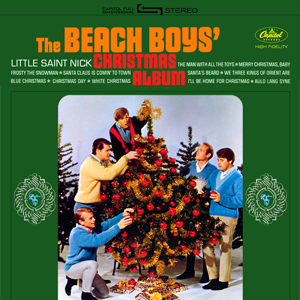
The Beach Boys' Christmas Album is the seventh studio album by the American rock band the Beach Boys, released November 9, 1964 on Capitol Records. It contains five original songs and seven standards on a Christmas theme. The album proved to be a long-running success during subsequent Christmas seasons, initially reaching No. 6 on Billboard's Christmas LP's chart in its initial release and eventually going gold. Music historian James Perone wrote that it is "regarded as one of the finest holiday albums of the rock era".

Wild Honey is the thirteenth studio album by the American rock band the Beach Boys, released on December 18, 1967, by Capitol Records. It was the group's first foray into soul music and was heavily influenced by the R&B of Motown and Stax Records. The album was the band's worst-selling at that point, charting at number 24 in the US. Lead single "Wild Honey" peaked at number 31, while its follow-up "Darlin'" reached number 19. In the UK, the album peaked at number seven.

Friends is the fourteenth studio album by the American rock band the Beach Boys, released on June 24, 1968, through Capitol Records. The album is characterized by its calm and peaceful atmosphere, which contrasted the prevailing music trends of the time, and by its brevity, with five of its 12 tracks running less than two minutes long. It sold poorly, peaking at number 126 on the Billboard charts, the group's lowest U.S. chart performance to date, although it reached number 13 in the UK. Fans generally came to regard the album as one of the band's finest.
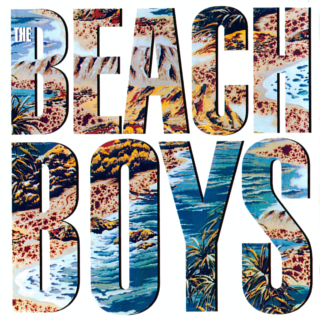
The Beach Boys is the 25th studio album by American rock band the Beach Boys, released on June 10, 1985. Produced by Steve Levine, the album is the band's first after the drowning of founding member Dennis Wilson. It was also the band's first album to be recorded digitally and the last released by James William Guercio's Caribou Records. The record sold poorly, charting at number 52 in the U.S. and number 60 in the UK.
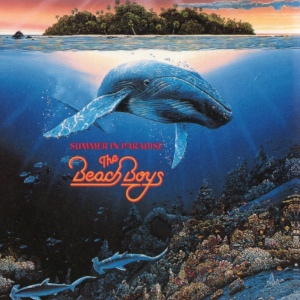
Summer in Paradise is the twenty-seventh studio album by American rock band the Beach Boys, released on August 3, 1992, by Brother Records. Produced by Terry Melcher, it is the only album not to feature any new contributions from Brian Wilson, and has been regarded as the band's critical and commercial low point, failing to chart in either the US or UK and receiving almost unanimously negative reviews. In North America, it was the group's first album to be released only on CD and cassette, with a rare vinyl pressing released only in South Korea. The Beach Boys did not record another album of predominately original material until That's Why God Made the Radio in 2012. Summer in Paradise was left out of Capitol's Beach Boys CD reissue campaign of 2000 to 2001, as well as all other reissues for most of the group's discography. Both it and its predecessor, Still Cruisin', are currently out of print. Summer in Paradise, along with Still Cruisin, were pulled from later re-releases due to poor public reception.
"Busy Doin' Nothin'" is a song by the American rock band the Beach Boys from their 1968 album Friends. Written by Brian Wilson, the lyrics reflect the minutiae of his daily social and business life, while the music, Wilson said, was inspired by "bossa nova in general".
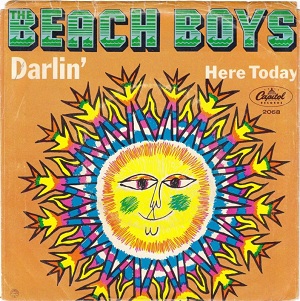
"Darlin'" is a song by American rock band the Beach Boys from their 1967 album Wild Honey. Written by Brian Wilson and Mike Love, it was inspired by singer Danny Hutton and was originally intended to be recorded by an early version of Three Dog Night. Carl Wilson ultimately sang the lead vocal.
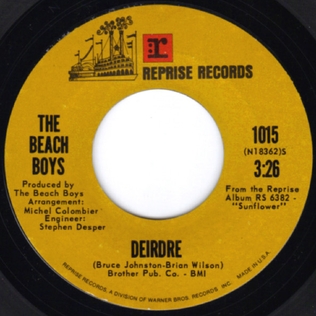
"Deirdre" is a song by the American rock band the Beach Boys from their 1970 album Sunflower. Written primarily by Bruce Johnston, it is a love song named after the sister of one of his ex-girlfriends, and is one of his two song contributions on the album, the other being "Tears in the Morning". Johnston has claimed that co-writer Brian Wilson's contributions were limited to a few lyrics, although music historians Andrew G. Doe and John Tobler wrote in 2004 that "Deirdre" had been "developed from a musical theme first used in 'We're Together Again,'" a 1968 composition credited to Brian Wilson and singer Ron Wilson.

"Wild Honey" is a song recorded by the American rock band the Beach Boys. Written by Brian Wilson and Mike Love, it was released as the lead single from their 1967 album Wild Honey, with the B-side of the single being "Wind Chimes". The single peaked at number 31 in the U.S. and number 29 in the U.K.
"Time to Get Alone" is a song by the American rock band the Beach Boys from their 1969 album 20/20. Written by Brian Wilson and produced by Carl Wilson, it is a baroque pop waltz. Brian originally intended the song for Redwood, the band that evolved into Three Dog Night.
"Aren't You Glad" is a song written by Brian Wilson and Mike Love for American rock band the Beach Boys. The two also share lead vocal. It was released in 1967 as the second track on their studio album Wild Honey.
"Let Him Run Wild" is a song by the American rock band the Beach Boys from their 1965 album Summer Days . Written by Brian Wilson and Mike Love, it was issued as the B-side to "California Girls".
"Here Comes the Night" is a song by the American rock band the Beach Boys from their 1967 album Wild Honey. Written by Brian Wilson and Mike Love, the group later rerecorded the track for their 1979 album, L.A. , as a disco song lasting nearly eleven minutes. A four-minute edit of this version was released as a single on February 19, 1979 and reached number 44 on the U.S. Billboard Hot 100.
"Lady" is a song written by Dennis Wilson, recorded by him with Daryl Dragon and released under the name "Dennis Wilson & Rumbo" in the United Kingdom on 4 December 1970, on Stateside Records. The song served as the B-side of the "Sound of Free" single. The single was not issued in the United States.

"You're Welcome" is a song written by Brian Wilson for American rock band the Beach Boys. It was released on July 24, 1967 as the B-side of the "Heroes and Villains" single. It later appeared as a bonus track on the compilations Smiley Smile/Wild Honey (1990) and The Smile Sessions (2011).
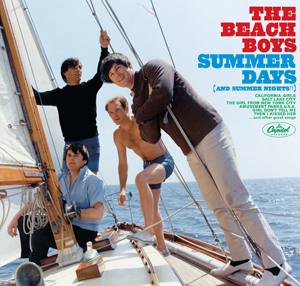
Summer Days is the ninth studio album by the American rock band the Beach Boys, released on July 5, 1965, by Capitol Records. The band's previous album, The Beach Boys Today!, represented a departure for the group through its abandonment of themes related to surfing, cars, and teenage love, but it sold below Capitol's expectations. In response, the label pressured the group to produce bigger hits. Summer Days thus returned the band's music to simpler themes for one last album, with Brian Wilson combining Capitol's commercial demands with his artistic calling.

Adult Child is an unreleased studio album by the American rock band the Beach Boys that was produced in early 1977. Similar to the release it was meant to follow, The Beach Boys Love You, the album is essentially a semi-autobiographical solo effort by the band's chief songwriter and producer, Brian Wilson. The title refers to a theory that one's personality can be split into "adult" and "child" modes of thinking.
"Sherry She Needs Me" is a song written in 1965 by Brian Wilson and Russ Titelman for the American rock band the Beach Boys. The recording was not released until decades later. As a solo artist in 1998, Wilson completed the song with lyric changes by Carole Bayer Sager; it was renamed "She Says That She Needs Me" and released on his album Imagination.
References
- ↑ Doe, Andrew G. "Tours & Sessions 1967". Bellagio 10452. Endless Summer Quarterly.
- ↑ Greenwalk, Matthew. "Let the Wind blow". AllMusic .
- ↑ Doe, Andrew; Tobler, John (2004). Brian Wilson and the Beach Boys: The Complete Guide to Their Music . ISBN 9781844494262.
- ↑ Lambert, Philip (2007). Inside the Music of Brian Wilson: The Songs, Sounds, and Influences of the Beach Boys' Founding Genius . Bloomsbury Publishing. ISBN 978-1-4411-0748-0.
- ↑ Hickey, Andrew (2011). The Beach Boys On CD: Volume 1 1961-1969. lulu.com. p. 143. ISBN 978-1-4475-4233-9.
- ↑ Harrison, Daniel (1997). "After Sundown: The Beach Boys' Experimental Music" (PDF). In Covach, John; Boone, Graeme M. (eds.). Understanding Rock: Essays in Musical Analysis. Oxford University Press. pp. 50–51. ISBN 9780199880126.
- ↑ Faust, Edwin C. (September 22, 2003). "The 1967-1971 Beach Boys: Long Promised Road". Stylus Magazine . Archived from the original on September 7, 2015. Retrieved August 5, 2015.
- ↑ Sculatti, Gene (September 1968). "Villains and Heroes: In Defense of the Beach Boys". Jazz & Pop. Archived from the original on 2014-07-14.
- ↑ Blum, Jordan (September 27, 2013). "Made in California". PopMatters .
- ↑ Slowinski liner notes, ESQ Issue 121